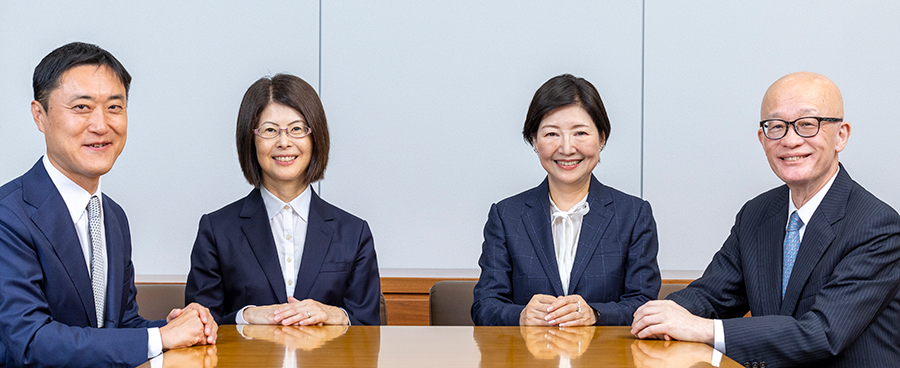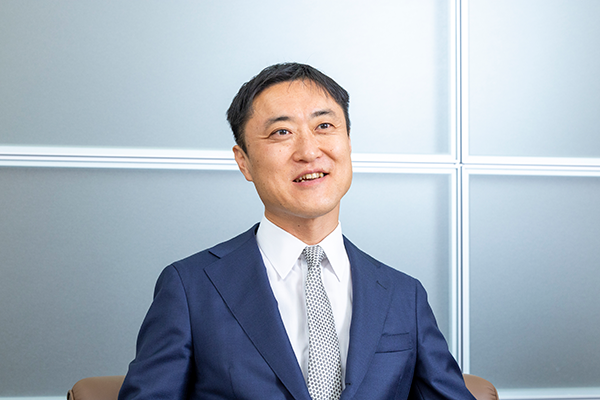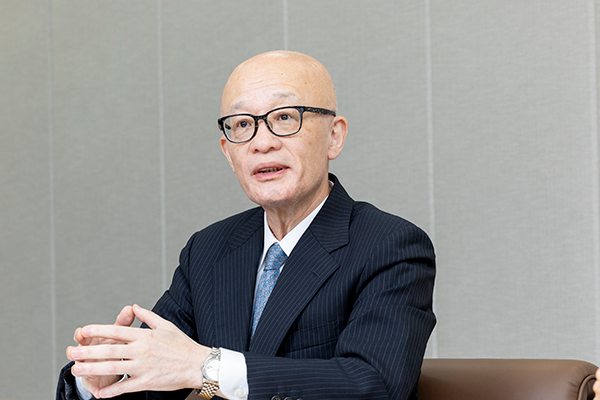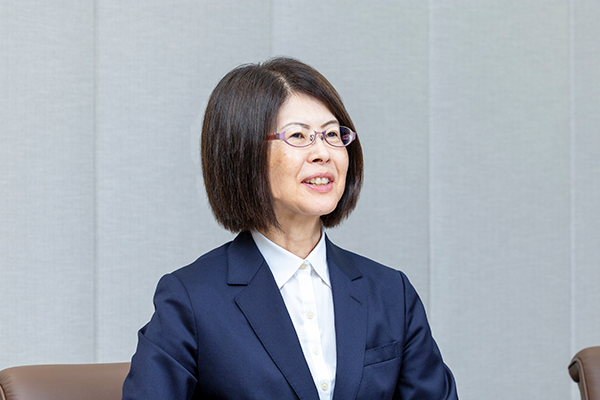Corporate Governance Roundtable

From left to right in the photo
Shoichi Tsumuraya:Professor, Hitotsubashi University (Facilitator);Naoko Mizukoshi:External Director;Junko Sunaga:External Director;Toru Kuwano:Chairman and Director(Chairman of the Board of Directors)
- Board of Directors’ Mission and Current Status
- Atmosphere at Board Meetings and Effectiveness of the Board
- Capital Policy and Market Evaluation
- Shareholder Dialogue and Assessment of Corporate Value
- Initiatives by Nomination and Compensation Committees, and Efforts to Reinforce Governance Going Forward
- Board of Directors’ Role Going Forward, and Dialogue-Inspired Vision for the Future
- Related Links
TIS aims to achieve sustainable improvement in corporate value and is constantly working to enhance corporate governance. In this roundtable, the Chairman of the Board and two external directors delve into the status of measures to reinforce management capabilities through effective discussion and decision-making.
Board of Directors’ Mission and Current Status
Q.In your opinion, what is the mission of the Board of Directors, and what is the current status of the Board?

Tsumuraya : Let’s start off with the current status of the Board of Directors. If the ideal destination of corporate governance—that is, the establishment of effective governance to increase corporate value—was the top of Mount Fuji, how far do you feel you have climbed?

Kuwano : The role of the Board of Directors is to improve corporate value from a whole group perspective. I am proud to say that corporate governance has evolved, at least to a certain degree, exemplified by steps to separate oversight and execution and by greater transparency in the decision-making process through the appointment of external directors to chair the Nomination Committee and the Compensation Committee, which are advisory bodies to the Board of Directors. I would have to say, though, that we’ve only just reached the fifth station, which is halfway up the mountain but the starting point of trails to the summit. Our focus so far has been on responding to the demands of society—predominantly through the Corporate Governance Code—and while there are many issues to address going forward, we have a pretty good idea what they are. It’s like following a trail—still uphill—with signposts. That said, it’s still up to us to travel that path all the way to the top. Continued growth in the rapidly changing IT industry requires an ability to identify and solve problems independently, and I believe circumstances will make it more difficult than ever to do exactly that.

Mizukoshi : When I was appointed as the first female external director on the TIS Board of Directors in 2018, the chairman also served as president. I think this created the heightened risk of discussions dominated by internal rationale. At the time, TIS probably wasn’t even close to the fifth station. But reforms implemented since then have brought a dramatic change in awareness, internally speaking, and I feel that TIS is probably somewhere around the sixth or seventh station now. There’s still room for improvement, of course, in terms of the external director ratio and skills diversity, and some distance left to climb before TIS reaches peak Board of Director performance, no pun intended.

Sunaga : I would have to agree with Mr. Kuwano that TIS is only at the fifth station. When I assumed my position in 2024, the framework for Group Vision 2032 and Medium-Term Management Plan (2024–2026) were already set. But I wondered, could TIS really achieve its stated goals? The path forward is murky in places, and more discussion is necessary with the executive side at Board meetings. So yes, I’d say TIS is at the fifth station—halfway to the summit but only just getting into the real climb to the top.
Atmosphere at Board Meetings and Effectiveness of the Board
Q.Describe the atmosphere at Board meetings. And what issues must be addressed to improve Board effectiveness?
Tsumuraya : How would you describe the atmosphere at TIS Board meetings?
Mizukoshi : Open. External directors can speak freely and in fact do. Our opinions are taken seriously, and I get the feeling that internal directors have become increasingly aware that ignoring the opinions of external directors, who reflect the perspectives of shareholders and other stakeholders, is itself a governance issue. That said, as noted in the evaluation of the effectiveness of the Board of Directors, I would like to see internal directors be more vocal.
Kuwano : One of the reasons internal directors may be reticent to speak up is that those who also hold an executive position don’t fully appreciate the scope of their responsibilities and tend to comment as the head of their respective department instead of participating actively as a member of the team responsible for management of the entire TIS INTEC Group. It’s somewhat inevitable, I guess, that internal directors will have a perspective that leans more toward the executive position, and we’ll have to accept that. And so I’m wondering, to ensure suitably in-depth discussions, would it be better to increase the number of external directors or encourage internal directors to acquire a groupwide perspective?
Sunaga : I, too, get the impression that the Board of Directors welcomes comments and is serious about responding to issues. I feel the Board is extremely sound. I believe the Board as a whole listens with all sincerity to the opinions of external directors. Indeed, there were times when the executive team actually withdrew a proposal from the agenda after meetings where external directors voiced opposing views. Directors who also hold an executive position have the task of growing the businesses they are responsible for, and there may be times when such directors find it difficult to present their opinions for groupwide review. For this reason, I think it’s all the more important to formulate and oversee a succession plan whereby the management team is selected by the Nomination Committee or some other structure.
Tsumuraya : I completely understand your point about the need to make internal directors more aware of their duties, as that would provide a more groupwide perspective to discussions, and I also agree that the appointment of directors conscious of their broader role is vital to this purpose.
Capital Policy and Market Evaluation
Q.Does the Board of Directors discuss capital efficiency or only profit/loss issues? And how does the Board view the market’s evaluation of TIS?
Tsumuraya : Enhanced capital efficiency is an inescapable theme because of heightened pressure on TIS to improve corporate value. Capital efficiency is important from a shareholder perspective, and so I wonder, is capital efficiency a frequent topic of discussion by the Board of Directors?
Mizukoshi : Of course it is. The Board used to focus on indicators of profit and loss, such as operating margin, but in the last two or three years, conversations have increasingly leaned toward capital efficiency as a key component of balance sheet management. Consequently, discussions that involve capital policy are common.
Sunaga : In dialogue with institutional investors, a great many questions target management indicators, such as ROE, and I feel the Board is giving a lot more attention to ROE as a key indicator of corporate performance.
Mizukoshi : The evolution of discussions can be broken down into three stages. Initially, the focus was on improving businesses with low operating margins and implementing structural reform. Then the focus expanded to include steps to boost return on assets (ROA), mainly by reducing strategic shareholdings and selling off unnecessary assets. Currently, discussions revolve around the content of dialogue with investors and reflect a deeper awareness of balance sheet management and capital costs.
Kuwano : I believe our capital policy is starting to gain a certain degree of market recognition. The problem, as I see it, is that we haven’t described our growth strategy clearly enough and we haven’t been able to sufficiently demonstrate to the outside world that progress toward stated goals is on track. Our recent PER is slightly lower than the industry average, which the market might interpret as indicative of a growth strategy that lacks a necessary element. PER lower than that of our competitors might also indicate that the path we are traveling is not as clear from an external perspective as it is to us. This is of course concerning to the Board of Directors, so we are preparing meeting agendas that allocate more time to discussions about growth strategy.
Mizukoshi : In an industry undergoing rapid change, the market is trying to determine whether TIS has a future, whether it can remain a company of choice. Enhanced governance is vital to corporate permanence amid industry evolution, but real growth is also essential. TIS still has difficulty getting the market to understand the corporate narrative on M&A activity, overseas strategy and building the business portfolio, but perhaps the content itself needs to be better defined.
Kuwano : We need to improve employee value because employees are the source that feeds corporate value. To boost profits while maintaining staffing levels, it’s exceedingly important from a management efficiency perspective to grow our service-based businesses, invest in human resources, and build stronger relationships with partners. These are areas best addressed not by the executive team alone but rather through a wider effort that involves the Board of Directors in deciding what policies or approaches to adopt.
Q.How is the issue of human capital management addressed?
Tsumuraya : What kind of conversations do you have on human capital management to raise productivity and profitability per person?
Sunaga : The Medium-Term Management Plan (2024–2026) calls for robust investment to strengthen human capital. In Japan, more so than overseas, the emphasis is placed on hiring new graduates, and my impression is that there is sufficient discussion about human capital and that an appropriate amount is earmarked for investment, such as for education and better employee benefits, to boost the added value of human resources.
Mizukoshi : All companies struggle with placing the right people in the right positions, but TIS believes that developing leaders through its human resource strategy—and demonstrating this internally and externally—will also help retain excellent talent.
Shareholder Dialogue and Assessment of Corporate Value
Q.What did you learn from your dialogue with institutional investors?
Tsumuraya : I know you’ve been involved in conversations with institutional investors. What questions were you asked and were any particularly memorable?
Mizukoshi : A lot of questions targeted capital efficiency, which is a KPI that TIS has tapped in the Medium-Term Management Plan (2024–2026), but there were also questions about incentives as executive compensation and measures for monitoring the status of growth strategies. A comment that stayed with me was that TIS should increase its external director ratio, given the important role that external directors play in good corporate governance.
Sunaga : There was a lot of interest in TIS’ approach to reaching its long-term target of 20% for ROE and some suggestions regarding better control of excess capital. The excess capital theme is one that the Group understands. Some companies overseas are able to increase their return on capital just by reducing equity capital, which is the ROE denominator, but business growth to increase profits, which is the ROE numerator, shouldn’t be discounted. In addition, I believe being asset-light means disposing of unnecessary assets. However, in regard to core facilities, it was pointed out that TIS shifted from leasing, mainly for system operations, to ownership. I think it’s best for the Company to hold on to these facilities right now out of its social responsibility to protect clients’ information assets. This was communicated to institutional investors so that they would understand why TIS doesn’t sell off the properties. The most important thing is to improve corporate capabilities, and on that basis, the Board must supervise the implementation of capital policies in a fair and flexible manner.
Q.How do you think corporate value should be measured?
Tsumuraya : In recent years, activist-driven takeovers and shareholder proposals have intensified in Japan. Against this backdrop, has the Board discussed target market capitalization that represents fair corporate value and market valuation?
Mizukoshi : It’s only natural, from a shareholder’s perspective, to expect the stock price to rise and market capitalization to increase. We understand that. We monitor market capitalization, but setting market capitalization as a direct target could trap the Company in short-term measures to boost stock price. Any such measure would require careful discussion. However, the most important aspect to maintain and then improve management stability while running a company conscious of stock price is, without a doubt, the ability to increase stock price along with healthy growth.
Tsumuraya : One of the conditions for preventing unforeseen situations would be for internal directors to understand the thinking that drives institutional investors, notably activists, to fixate on market capitalization, and to enhance financial literacy.
Sunaga : Financial literacy can be acquired through experience, and understanding the perspective of activists and other control-seeking investors can lead to enhanced governance. That said, external proposals are often crafted from a short-term perspective, so TIS must always remember that the fundamental principle of business is to achieve sustainable improvement in corporate value, in line with OUR PHILOSOPHY, the TIS INTEC Group’s basic philosophy.
Initiatives by Nomination and Compensation Committees, and Efforts to Reinforce Governance Going Forward
Q.Describe the initiatives undertaken by the Nomination and Compensation Committees and efforts to reinforce governance going forward.
Tsumuraya : The Nomination and Compensation Committees fulfill a major role in shaping the Board of Directors. Ms. Mizukoshi, as an external director and recent chair of these committees up to fiscal 2025, what did you emphasize in running these committees?
Mizukoshi : One of the Nomination Committee’s core missions is to formulate a succession plan. When considering who to recommend as the next person to fill the top management position, we look for candidates with leadership qualities and abilities conducive to success in this rapidly changing environment, and we emphasize selection through a transparent process. For external directors, we focus on diversity, and for internal directors, we assess candidates’ capacity to contribute to development of the Group. The scope of our discussions goes beyond members of the Board of Directors to directors at Group companies and, in the case of core companies, executive officers as well. Most recently, the Compensation Committee revised the director compensation system, after a good year and a half thoroughly discussing the system, and increased the ratio for performance-linked compensation.
Tsumuraya : In terms of meeting frequency, the Nomination Committee met eight times and the Compensation Committee met six times in fiscal 2024, which was more often than at other companies.
Mizukoshi : That’s right. When we’re discussing important issues, such as changes to compensation and measures to fine-tune succession planning, we’re bound to meet more often. We give important issues the amount of time and effort required to ensure an appropriate outcome.
Sunaga : At the same time, the agenda put forward to the Board of Directors underwent a review, and we allocate more time to discussions on key items pertaining to medium- to long-term growth. I think these efforts have helped enhance the Board’s efficiency and the quality of discussions and eventual decision-making.
Kuwano : As chairman of the Board, I play a significant role, not only in running the meeting on the day but also in deciding which topics to discuss and ensuring that we don’t fail to bring up important points that require input from the executive side. Points of particular importance to enhanced governance would include increasing the number of external directors, determining the number of internal directors who also hold executive positions and their respective scope of duties, and the positioning of non-executive internal directors like myself. The nomination and compensation committees address succession planning not only for top management but also for the executive ranks, and the process might present a few challenges since the conversations involve specific individuals. There are still many topics to discuss, which is one of the reasons why I said we are only at the halfway point to our corporate governance destination.
Board of Directors’ Role Going Forward, and Dialogue-Inspired Vision for the Future
Tsumuraya : From what you have all said, I sense that governance at TIS is steadily evolving and that management has a strong desire to achieve sustainable improvement in corporate value. At the same time, I think you all accept the fact that governance practices could be enhanced further. Could you each offer your thoughts on how TIS should do that?
Mizukoshi : In the years since I became an external director, TIS has significantly strengthened the systems and mechanisms that support the Board of Directors. However, some aspects of the business portfolio and the vision for growth in each service domain remain unclear, and I feel the Board could do more to promote clarity. For about two years, I’ve been engaged in extensive discussions to take governance to the next level, and I’d like to see Board effectiveness improve along with enhanced governance.
Sunaga : First of all, achieving the KPIs in the Medium-Term Management Plan (2024–2026) is fundamental to fulfilling the expectations of shareholders. I’d like to apply insights gained through real dialogue with institutional investors to reinforce management capabilities and closely monitor the implementation status of growth strategies to increase TIS’ practical value. Accordingly, the market’s evaluation of TIS will improve along with expectations for growth into the future, and I’ll have contributed to the underlying reasons for an increase in TIS’ stock price.
Kuwano : When TIS and two other Group companies merged in 2011, with TIS as the surviving company, I was president and busy building the organization. Immediately after the merger, the issues before me were clear, and I worked diligently every day to address those issues. But a few years later, when everything had settled down, I remember thinking about what had to be done next and how to go about executing those next steps. That was where things got more challenging. As I mentioned at the beginning of this discussion, the same is true for improving corporate governance. Until now, what needed to be done was pretty obvious, but going forward, the path ahead isn’t so clear-cut. Our journey will require us to think for ourselves about what we should do—essentially, carving our own path—and as Chairman, steering the Board of Directors through corporate seas, it’s my duty to facilitate effective and constructive discussions that contribute to the sustainable growth and increased corporate value of TIS and, by extension, the whole TIS INTEC Group. Now is the time to take corporate governance to new heights.
Tsumuraya : I hope that today’s discussion will fuel further progress in your corporate governance journey and in sustainable improvement in corporate value.
September 30, 2025
